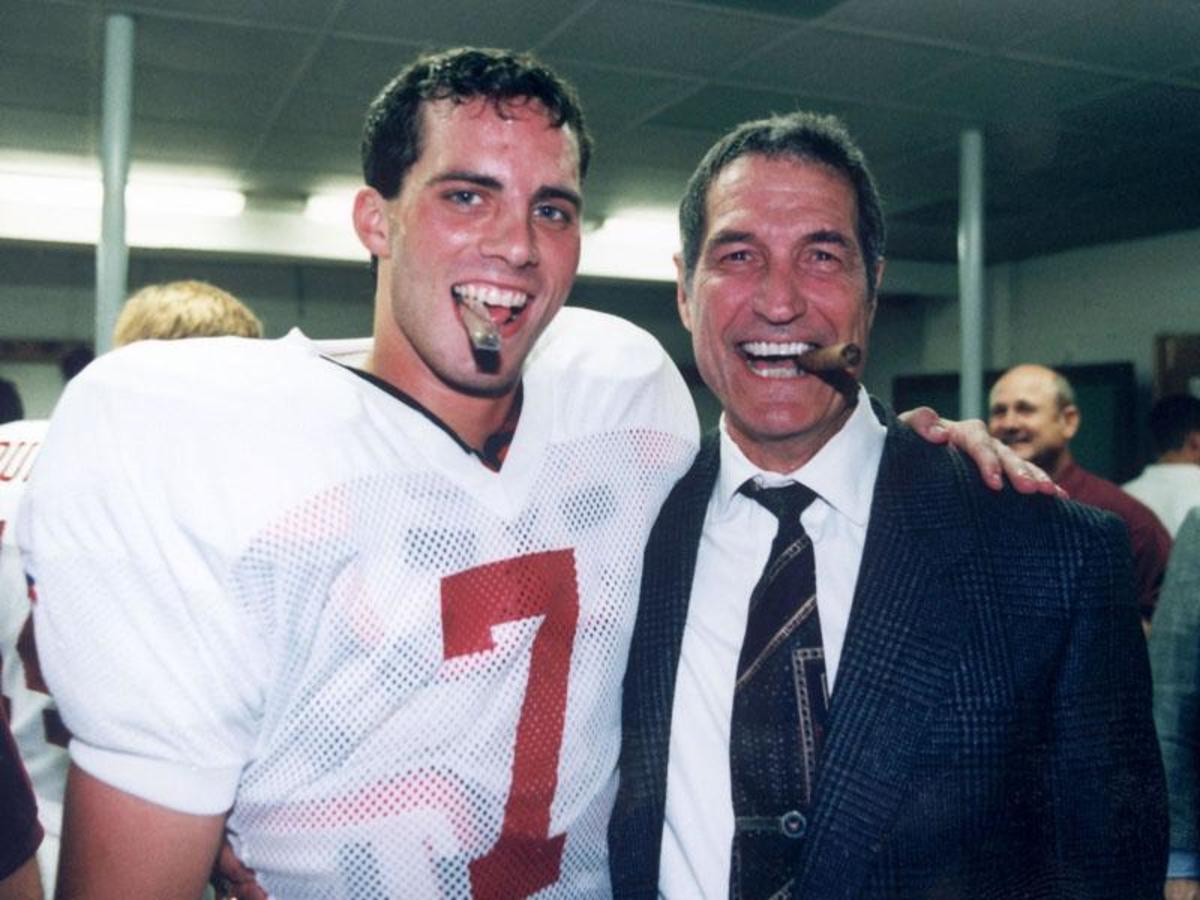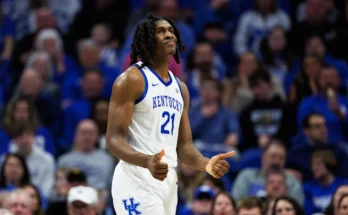Georgia Closing in on All-Time Greatness as Bulldogs Chase Alabama’s Legendary AP Poll Streak with 131-Week Run
College football dynasties are defined by more than just national titles or playoff appearances. They are forged through sustained excellence, marked by dominance week after week, year after year. In a sport where consistency is elusive and every Saturday can bring upheaval, remaining a fixture in the Associated Press (AP) Top 25 poll is a testament to a program’s ability to stay ahead of the curve. Right now, the University of Georgia stands tall in that regard, boasting the second-longest active streak in the nation — 131 consecutive weeks in the AP Top 25.
That mark, still growing with each passing season, places Georgia squarely in the spotlight of college football history. While Alabama’s historic 128-week streak under Nick Saban from 2008 to 2021 remains the gold standard of the playoff era, and their 105-week run under Gene Stallings in the 1990s holds a prominent place in history, Georgia is threatening to surpass them all.
For the Bulldogs and head coach Kirby Smart, this run isn’t just about numbers on a poll. It’s about solidifying a legacy that has evolved dramatically in the past decade. Since taking over in 2016, Smart has transformed Georgia from a perennial contender into a powerhouse that reloads instead of rebuilds. The result? A stretch of dominance that includes back-to-back national championships in 2021 and 2022, along with SEC titles, elite recruiting classes, and a program identity rooted in discipline, physicality, and ruthless efficiency.
But the streak is more than just a byproduct of titles. It represents Georgia’s weekly excellence — their ability to avoid trap games, to perform under pressure, to remain relevant in the eyes of AP voters regardless of the opponent or setting. In college football, where the margin for error is often razor-thin, staying ranked for nearly three straight seasons is a feat few programs can match.
It’s worth noting that Georgia’s run comes at a time when the SEC is arguably at its most competitive. Programs like LSU, Tennessee, Ole Miss, and Alabama have all enjoyed national relevance in recent years, meaning Georgia’s hold on poll positions hasn’t come easy. They’ve had to beat the best, often in convincing fashion, to maintain their stature.
Consider how difficult it is to simply crack the AP Top 25, let alone remain there week after week. Teams can fall out with one loss, a sluggish performance, or even the perception of decline. Voters — made up of sportswriters and broadcasters from across the country — scrutinize every game, every play. For Georgia to maintain this level of excellence over 131 weeks is to prove they’re not just riding momentum or hype — they’re setting the pace.
Alabama fans, of course, remember their own proud streaks with fondness. Gene Stallings’ 105-week run from 1991 to 1994 was defined by dominant defenses, hard-nosed running games, and an old-school approach that brought the Crimson Tide a national championship in 1992. Under Stallings, Alabama became synonymous with consistency, a model of what it meant to show up every week and take care of business. That era helped bridge the gap from the Bear Bryant days to the modern age of SEC dominance.
Fast-forward to the Nick Saban era, and Alabama’s dominance became even more entrenched. From 2008 to 2021, the Crimson Tide were an immovable object in the Top 25 — often perched at or near No. 1. During that 128-week run, they not only won national championships but also became the benchmark against which all other programs were measured. Alabama didn’t just win games; they dictated the tempo of the sport. Every other program — Georgia included — was trying to keep up.
But now, the roles are shifting. Georgia is becoming the standard. They’ve emerged from Alabama’s shadow and are writing their own chapter of dominance. The current 131-week streak is evidence that this isn’t just a blip, but a new era. And while the Bulldogs may have once modeled their program after Alabama’s blueprint, they’re now showing signs of surpassing it.
Of course, streaks don’t last forever. Just ask Clemson, who was once among the poll’s most consistent presences before slipping in recent years. Injuries, coaching turnover, and recruiting misses can all derail even the most dominant of programs. That’s why Georgia’s ability to maintain momentum despite losing first-round NFL Draft picks, coordinators, and locker room leaders is so impressive. The streak proves that they’ve built something deeper than a single team — they’ve built a program.
It’s also about culture. Kirby Smart has instilled a mindset that echoes the great programs of the past: relentless preparation, attention to detail, and a refusal to be outworked. That culture allows them to win close games, dominate lesser opponents, and avoid letdowns. That culture is what has carried them through injuries, adversity, and the ever-present pressure of being ranked.
It’s worth remembering how quickly fortunes can change in college football. Just a few years ago, Georgia was seen as a team that couldn’t quite get over the hump. They lost heartbreaker after heartbreaker to Alabama. They fell short in big games. But now, they’ve flipped the narrative. Now it’s Georgia that carries the weight of expectation — and so far, they’ve worn it well.
For fans, the streak is a source of pride. It means every Saturday, Georgia is in the national conversation. It means recruits see a program that wins, no matter the opponent. It means the Bulldogs are more than just a team — they’re an institution.
Alabama fans understand that pride all too well. For years, they dominated the sport with a stoic efficiency that became the envy of the country. While the Saban era appears to be entering its twilight — and with new head coach Kalen DeBoer steering the ship — the torch may truly be passing to Athens.
Still, it’s important not to overreact to streaks. They are impressive, yes, but not the sole indicator of a program’s health. What matters more is what those weeks represent: excellence, preparation, depth, and culture. And on that front, Georgia looks poised to maintain its place near the top for years to come.
It also sparks an important question: How long can Georgia keep this up? The road ahead won’t get easier. With Texas and Oklahoma joining the SEC, the gauntlet becomes even more brutal. One slip, one unlucky bounce, and the streak could be gone. That’s the nature of college football. But if the past 131 weeks have shown us anything, it’s that Georgia doesn’t slip often.
The next benchmark will be surpassing Alabama’s Saban-era 128-week streak, which they already have. After that? Eyes will turn to Florida’s 209-week record from 1990 to 2001 under Steve Spurrier. That remains the all-time record for consecutive AP Top 25 appearances. It’s a lofty goal, but if any current team has the foundation to reach it, it’s Georgia.
Even if the streak ends tomorrow, Georgia has already etched their place in the annals of college football. They’ve proven that the program isn’t just built to contend — it’s built to last. The 131-week run (and counting) is a symbol of everything Kirby Smart has accomplished and a preview of what may still come.
And as for Alabama? They may be temporarily out of the spotlight, but don’t count them out. If the Crimson Tide have taught us anything over the years, it’s that greatness doesn’t fade quietly. A new streak could begin sooner than anyone expects.
But for now, all eyes are on Georgia. The Bulldogs are chasing history, and they don’t seem interested in slowing down.



